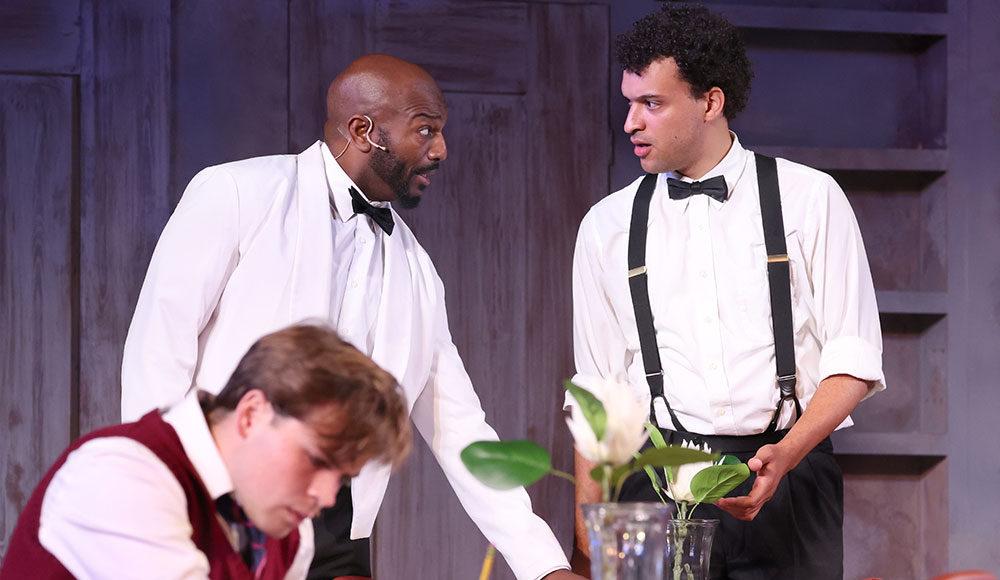It takes skill, courage and psychological insight to forge an organic theater piece using only three players and a controversial script. Yet that’s exactly what Santa Cruz Shakespeare’s Rebecca Haley Clark has done with Athol Fugard’s “Master Harold” … and the Boys. Emotional intensity ripples through each line, each exchange, each gesture of this disarming production.
The genius of Fugard, a white South African who grew up amid the injustices of apartheid, is to be able to intensify the shock of racial prejudice by writing it into an intimate rainy afternoon spent by a privileged white teenager and two black employees at his mother’s tearoom. A quick glance at Fugard’s biography shows that the white teenager, called Hally by longtime family employee Sam (Corey Jones), is a surrogate for Fugard himself. Both the character and his creator had handicapped fathers. Fugard’s first name was Harold. And both Hally and Fugard stepped over an invisible line in their youth. Written in 1982, ten years before the end of apartheid, the play is set in 1950s South Africa. Corey Jones is breathtaking.
Especially strong in its middle section, the play is richly textured with the reminiscences of young Hally (a faultless Nick Rossi) and the older black man, Sam. Sam offers help with Hally’s homework essay, and soon the discussions become animated with memories of a joyful day of kite flying with Sam. But fueled by his mother’s intrusive phone calls the tearoom conversation escalates, with Hally’s embarrassment over his alcoholic father’s handicap boiling over into the demand that Sam now call him Master Harold, as Willy (Elliot Sagay) always does.
Here is where Clark shows her gifts for psychological nuance. The bold and frank confessions of all three characters sent shivers through opening night’s audience, who understandably had difficulty with Fugard’s historically accurate use of the “N” word. The play opens with the two black employees setting up the tea room for customers, big band swing music playing in the background. In between setting up tables, glassware and other accessories, Sagay and Jones show off their dancing prowess. Corey Jones is breathtaking. Clark’s actors fill the stage with enough bits of action, movement and fussing around that the space soon bristles with real-world texture. Sagay, who in this season’s repertoire has shown himself capable of just about anything, is a miracle of movement. Subtly, and continuously, he sets up, cleans and then puts away everything in the tearoom’s inventory. His movements create a living tissue of context that gives intensity and credibility to the more dramatic events.
As Hally, Nick Rossi does exactly what he has to in an unsympathetic role. Hally is the repository of centuries of prejudice, oblivious to the legal boundaries that separate his privilege from the lives of Sam and Willy. Rossi manages to stand his ground against the virtuoso presence of Corey Jones as the wise, patient and ultimately defiant Sam. Jones is extraordinary throughout, delivering a towering performance, brilliant and brave. His final moments onstage with Sagay—smartly designed and lit with bravura—were among the most poignant this stage has ever seen. I still get chills.
The central drama between the young white man and the older black employee has been given room to breathe by an enveloping preoccupation with an upcoming ballroom dancing contest. Willy, lacking natural grace, is coached by Sam in a variety of Astaire and Rogers stylistic moves for the upcoming ballroom contest that forms one node of the play’s trajectory. The other involves phone calls between the son and the absent mother from the father’s hospital room, which allows us to watch Hally grapple with his confused emotions about his father.
But between those two poles blooms the deepening tension and finally out and out emotional violence of the complex relationship between Hally and Sam, where the enveloping culture (and bigotry) of segregation has seeped into the white youth’s pores. Seemingly without conscious choice on his part. And that, of course, is Fugard’s point.
Fugard tends to insist upon repetitious lessons in nostalgia, schoolboy homework exercises, and the outrage that has been swallowed for years by the black characters. Some editing might have been welcome, but memorable performances overcome the didactic tendencies. True artistry must push us out of our comfort zones. And this production is worth leaning into. Corey Jones is breathtaking.
Santa Cruz Shakespeare’s “Master Harold” … and the Boys, written by Athol Fugard and directed by Rebecca Haley Clark, runs September 10–14 and 17–20. The show is 90 minutes, without intermission. santacruzshakespeare.org














As usual, Christina, you captured the performance most adroitly